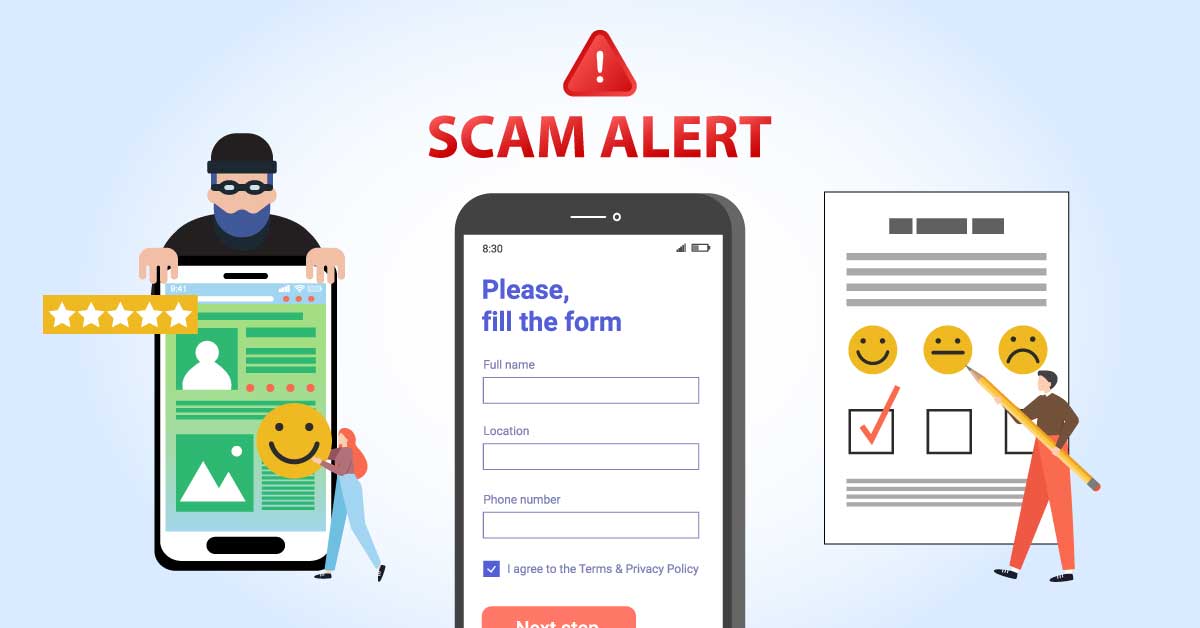Surveys are often seen as a win-win for both businesses and customers because participants are often rewarded with small gifts. Given the rewards for both, surveys might seem fun and harmless. That is, if you have not heard about Survey Scams.
Survey Scams as the name implies, usually involves an online form that asks for personal information. Similar to other scams, they usually do not ask for sensitive information straight away. In fact, this type of scam usually asks for non-personal information from participants. But before we go deeper, lets understand what Survey Scams actually are?
What Are Survey Scams?
There are plenty of businesses that ask their customers to take surveys to learn how they can improve their services. Whilst businesses get valuable information about their customers’ experiences, those who participate in surveys often get small gifts. Thus, participating in surveys might seem fun, until you hear about survey scams. A survey scam is a fake online form that asks for personal information like your email address, passwords, and credit card details in exchange for expensive gifts or tempting rewards.
As there been cases were participating in Survey Scams has resulted in identity theft and invasion of privacy, it is vital to know how to spot them. Over the years, Scammers have started to make their surveys more convincing by adding logos of well-known shop brands. Moreover, according to Naked Security, some survey scams have even offered inexpensive gifts so that their offer would appear more believable. For instance, there have been situations where people are promised the latest iPhone, Samsung, or Huawei mobile phone for only 1$. In this case, specialists have noticed that these tempting offers, make people rush to answer questions faster. In addition, fake surveys often add time pressure by promising the gift to only a handful of people.
By reading the rest of this blog, you can learn how survey scams work, how to recognize them, and how to protect yourself against them.
Types of Survey Scams:
When you’re on the hunt to make money, it’s tempting to spend a few minutes filling out an online survey that promises you a sweet monetary reward. But before you click, are you sure that the survey is legit? Here are some examples of survey scams you should watch out for.
- Covid Vaccine Survey Scam:
Scammers are using a new trick to steal your money and personal information in the form of a bogus COVID vaccine survey.
People across the country are getting emails and texts messages out of the blue, asking them to complete a limited-time survey about the Pfizer, Moderna, or AstraZeneca vaccine. In exchange, people are offered a free reward, but asked to pay shipping fees.
If you get an email or text like this, STOP. Don’t reply. It’s a scam.
- Impersonating Legitimate Companies:
Just because you get an online survey from a company like Walmart, doesn’t mean that survey is actually from Walmart. It can be a fraudster impersonating a legitimate company, which has happened to SurveyMonkey. As a result, now SurveyMonkey has a section on their site which warns customers to be aware of online surveys from fraudsters claiming to be sponsored by SurveyMonkey.
How to avoid survey scam?
An Online survey scam is a site that says they offer money or gift vouchers to participants for answering questions. Usually, these sites ask you to spend an unreasonable amount of time, for insufficient pay out. Often, the promised money or vouchers are never paid out. To stop yourself from falling for these scams, we’ve come up with our top tips on how to spot a Survey Scam.
- They ask for money upfront: Online survey scams ask users to pay a membership fee to a fictitious club or organization that claim they will send them information about upcoming paid surveys.
- They offer too much money or use questionable payment practices: Online surveys are useful only for someone looking to make a little supplemental income. Those that offer anything more are too good to be true.
- They lack a privacy policy: Fraudsters are not forthcoming when it comes to how they intend to use applicant’s personal information. As a result, there’s no need for criminals to create a privacy policy for an online survey scam. Instead, they can concentrate all of their energy on obtaining and then monetizing unsuspecting users’ information
- Watch out for phishing: If you receive an unsolicited email inviting you to take a survey in return for compensation, don’t take it. It’s most likely a phishing scam.
- Look for a privacy policy: All legitimate survey companies have a privacy policy. If you can’t find a privacy policy, you should assume the survey is a scam.
- Don’t get tempted by outlandish rewards: Nobody’s going to become a millionaire sitting around the house taking internet surveys.
We know surveys can be rewarding, but at the same time it can be detrimental. Before you start any survey, carefully check out the site before you sign up. Don’t pay a fee to complete surveys. Remember, legitimate ones don’t ask for money. Also keep in mind that sites that charge membership (or other fees) may be scams.


